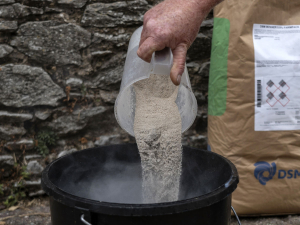Farmers are looking forward to less red tape and delay around approval processes for new agricultural and horticultural products.
In announcing a regulatory sector review at National Fieldays yesterday, Regulation Minister David Seymour said it can take years of wrangling to get approval for products already in use in other OECD countries.
"We’ve been pushing for change on this front for some time," Federated Farmers arable chair David Birkett says.
"We’re really pleased the Government is going to look into it, and we expect faster application timeframes to come out of it."
Fall armyworm controls and the methane-inhibiting feed additive Bovaer are just two examples of products approved overseas but denied to New Zealand farmers.
Royal DSM produces Bovaer a feed additive that enables farmers to achieve a significant and immediate reduction of the environmental footprint of meat, milk, and dairy products. DSM claims that on average, it reduces enteric methane emissions by 30% from dairy cows and 45% from beef cattle.
The company expects that by the end of this calendar year 17 out of the top 20 global dairy companies will have the ability to use Bovaer in their home markets if they choose to do so. Unfortunately, Fonterra are likely not one of those 17, it says.
DSM applied for approval of 3-NOP (the active ingredient in Bovaer) in February 2021, to the Environmental Protection Authority. In August 2023, the EPA approved DSM’s application to import and manufacture 3-NOP. MPI is responsible for the next step — assessing the substance before it can be used on farms. They have yet to receive an application from DSM.
According to EPA, Bovaer is a trade name product with a specific composition that we have not assessed for on farm use. The concentrations of 3-NOP approved by the EPA are restricted for use in manufacturing facilities only, they are not end-use products (for use on farm or by farmers) as that wasn’t part of DSM’s application.
It says MPI is responsible for assessing efficacy, animal welfare, the potential for residues in food, and risks to trade in primary produce.
"The EPA is working closely with MPI on the regulation of methane (and nitrogen) inhibitors, with the aim of streamlining the EPA’s application and assessment process for these substances."
Birkett points out that Bovaer is approved as safe for animals, farmers and consumers in more than 55 countries, including the EU, Australia, Canada and Switzerland.
"But our farmers can’t use it. After being held up by our Environmental Protection Agency for three years, approval is now stuck in New Zealand Food Safety processes.
"Farmers are being pushed to excel on biosecurity control, climate change and production fronts but red tape and inefficiency means ready access to the tools they need to meet these challenges is far too slow," Birkett says.
"As Food Safety Minister Andrew Hoggard noted at the review announcement, if our aim is to further increase primary product export revenue, it’s essential we iron out unnecessary regulatory overlap, costs and hold-ups.”



















